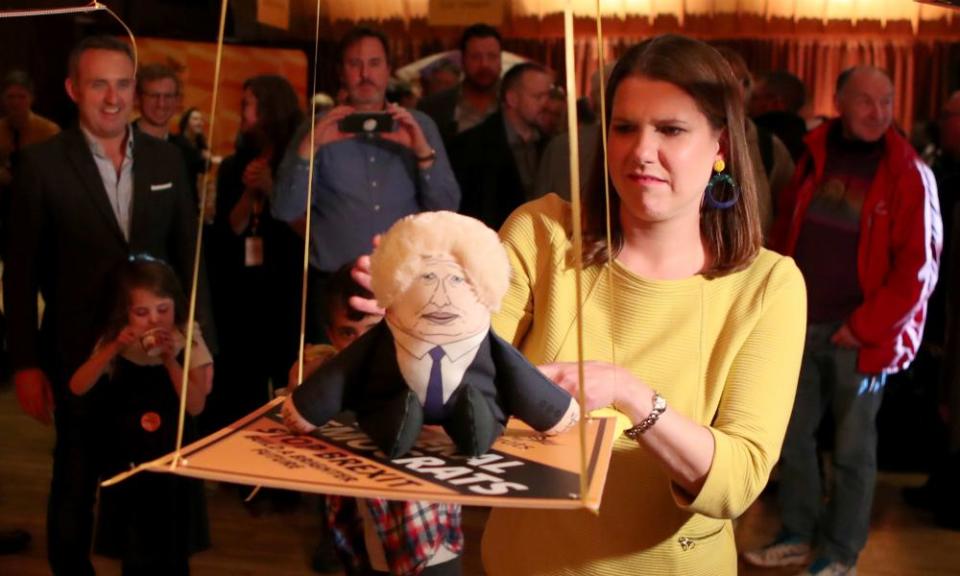Are the Lib Dems about to do another deal with the Tories?
Remember when Jo Swinson was going to win a majority? It was just a few short weeks ago that the Liberal Democrat leader was all over TV, managing to keep a straight face while attempting to brazenly mislead the public, a skill she presumably perfected in the coalition government. If recent polls are anything to go by, she now looks more likely to win a Bafta for that performance than she does to make substantial electoral gains.
Related: Is Jo Swinson's election campaign punching below its weight?
No surprise, then, that the party has changed tack, instead pitching itself as the only way to prevent a Tory majority and block a hard Brexit. But do the Lib Dems mean it, or would a whiff of power see them gleefully sell those who might consider lending them their support down the river, in much the same way they did with students in 2010?

While Swinson has ostensibly ruled out going into a coalition with either of the main parties, she hasn’t ruled out a more informal “confidence and supply” arrangement, such as that the Tories have enjoyed with the DUP. Some of her closest colleagues have dropped hints, with the party’s deputy leader, Ed Davey, admitting he believed the most likely outcome to be a Conservative minority government, which his party may be willing to prop up in return for a people’s vote.
Days later, Swinson herself conceded the Conservatives were on their way to a majority, but said her priority was preventing them getting one – which raises the question of why, throughout the campaign, she has appeared to oppose Labour with more vitriol than she can seem to muster for Boris Johnson. Might it be that the influx of pro-European former Tory MPs and anti-Corbyn Labour exiles hints at where her true preference lies? Swinson’s next-prime-minister act at the outset of the campaign gave her a justification for targeting Labour-contested seats. But if her priority is really to block a Conservative government, the Lib Dems could have started by not splitting the vote against them in those very races. Instead, her party continues not only to pour resources into them, but to actively obscure the electoral reality in a number of seats where only Labour has a realistic chance of winning.
Moreover, the Lib Dems’ recent history of ideological alignment with the Conservatives suggests that they may be more likely to work with them rather than with Labour. Many a progressive voter still harbours resentment over the epic betrayal of the 2010 coalition; a betrayal that gave Jo Swinson a cabinet position, from which she proceeded to vote with the Tory whip on issues such as the bedroom tax, disability cuts and welfare spending.
A grudging apology for austerity to Andrew Neil won’t cut it. And the ease with which the likes of Philip Lee and Sam Gyimah have been accepted into the party speaks to a shared rightwing agenda in the interests of business and the wealthy; indeed, the investigative journalism platform the Ferret found last week that the party had accepted two donations totalling £91,000 from an investment manager and a property developer with parent companies registered in tax havens. Swinson even went so far as to say that the most sensible question in any second referendum would be Johnson’s deal versus remain.
Far from reinvigorating a fertile centre ground, as the Conservatives have lurched further to the right, the Lib Dems have firmly taken up a centre-right mantle. While they are proposing quintupling spending on childcare, their plans to make benefits more generous for low-income working families with children only reverse a quarter of the discretionary cuts made to benefits since 2010. When even the Conservative party is campaigning on increased public spending, the Lib Dems will have to do a lot better than that to convince me of their progressive credentials.
As polls tighten and the Lib Dem vote continues to dwindle, attention will turn to possible power-sharing deals and arrangements in the event of a hung parliament. No party wants to talk about it, but it’s something voters need to consider. And with Swinson’s visceral dislike of Jeremy Corbyn apparent, and the Lib Dems’ track record of working with many that are still at the top of the Conservative party, it isn’t unreasonable to assume another “rose garden” moment could await us in the run-up to Christmas.
“Vote Lib Dem, get Tory” has become something of a Twitter mantra during this election, coined by those who oppose the party’s misleading messages about tactical voting and its potential to split the anti-Tory vote. But it’s worth considering that even the successful election of more Lib Dem MPs could ease Boris Johnson’s path back to No 10.
• Eve Livingston is a journalist specialising in politics, social affairs and inequalities

 Yahoo News
Yahoo News 
